| diagram | 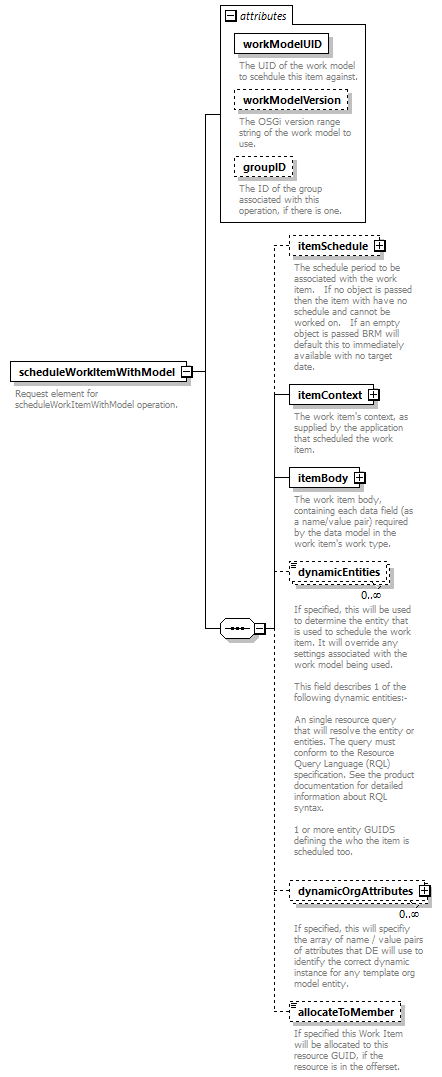 |
||||||||||||||||||||||||||||||
| namespace | http://api.brm.n2.tibco.com | ||||||||||||||||||||||||||||||
| properties |
|
||||||||||||||||||||||||||||||
| children | itemSchedule itemContext itemBody dynamicEntities dynamicOrgAttributes allocateToMember | ||||||||||||||||||||||||||||||
| attributes |
|
||||||||||||||||||||||||||||||
| annotation |
|
||||||||||||||||||||||||||||||
| source | <xs:element name="scheduleWorkItemWithModel"> <xs:annotation> <xs:documentation>Request element for scheduleWorkItemWithModel operation.</xs:documentation> </xs:annotation> <xs:complexType> <xs:sequence> <xs:element name="itemSchedule" type="ItemSchedule" minOccurs="0"> <xs:annotation> <xs:documentation>The schedule period to be associated with the work item. If no object is passed then the item with have no schedule and cannot be worked on. If an empty object is passed BRM will default this to immediately available with no target date.</xs:documentation> </xs:annotation> </xs:element> <xs:element name="itemContext" type="ItemContext"> <xs:annotation> <xs:documentation>The work item's context, as supplied by the application that scheduled the work item.</xs:documentation> </xs:annotation> </xs:element> <xs:element name="itemBody" type="ItemBody"> <xs:annotation> <xs:documentation>The work item body, containing each data field (as a name/value pair) required by the data model in the work item's work type.</xs:documentation> </xs:annotation> </xs:element> <xs:element name="dynamicEntities" type="xs:string" minOccurs="0" maxOccurs="unbounded"> <xs:annotation> <xs:documentation>If specified, this will be used to determine the entity that is used to schedule the work item. It will override any settings associated with the work model being used. This field describes 1 of the following dynamic entities:- An single resource query that will resolve the entity or entities. The query must conform to the Resource Query Language (RQL) specification. See the product documentation for detailed information about RQL syntax. 1 or more entity GUIDS defining the who the item is scheduled too. </xs:documentation> </xs:annotation> </xs:element> <xs:element name="dynamicOrgAttributes" type="orgdto:XmlDynamicIdField" minOccurs="0" maxOccurs="unbounded"> <xs:annotation> <xs:documentation>If specified, this will specifiy the array of name / value pairs of attributes that DE will use to identify the correct dynamic instance for any template org model entity.</xs:documentation> </xs:annotation> </xs:element> <xs:element name="allocateToMember" type="xs:string" minOccurs="0"> <xs:annotation> <xs:documentation>If specified this Work Item will be allocated to this resource GUID, if the resource is in the offerset.</xs:documentation> </xs:annotation> </xs:element> </xs:sequence> <xs:attribute name="workModelUID" type="xs:string" use="required"> <xs:annotation> <xs:documentation>The UID of the work model to scehdule this item against.</xs:documentation> </xs:annotation> </xs:attribute> <xs:attribute name="workModelVersion" type="xs:string"> <xs:annotation> <xs:documentation>The OSGi version range string of the work model to use.</xs:documentation> </xs:annotation> </xs:attribute> <xs:attribute name="groupID" type="xs:long"> <xs:annotation> <xs:documentation>The ID of the group associated with this operation, if there is one.</xs:documentation> </xs:annotation> </xs:attribute> </xs:complexType> </xs:element> |
attribute scheduleWorkItemWithModel/@workModelUID
| type | xs:string | ||
| properties |
|
||
| annotation |
|
||
| source | <xs:attribute name="workModelUID" type="xs:string" use="required"> <xs:annotation> <xs:documentation>The UID of the work model to scehdule this item against.</xs:documentation> </xs:annotation> </xs:attribute> |
attribute scheduleWorkItemWithModel/@workModelVersion
| type | xs:string | ||
| annotation |
|
||
| source | <xs:attribute name="workModelVersion" type="xs:string"> <xs:annotation> <xs:documentation>The OSGi version range string of the work model to use.</xs:documentation> </xs:annotation> </xs:attribute> |
attribute scheduleWorkItemWithModel/@groupID
| type | xs:long | ||
| annotation |
|
||
| source | <xs:attribute name="groupID" type="xs:long"> <xs:annotation> <xs:documentation>The ID of the group associated with this operation, if there is one.</xs:documentation> </xs:annotation> </xs:attribute> |
element scheduleWorkItemWithModel/itemSchedule
| diagram | 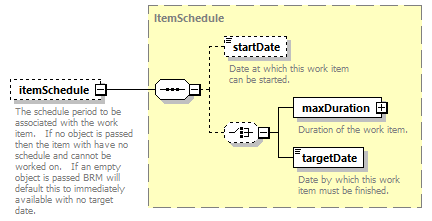 |
||||||
| type | ItemSchedule | ||||||
| properties |
|
||||||
| children | startDate maxDuration targetDate | ||||||
| annotation |
|
||||||
| source | <xs:element name="itemSchedule" type="ItemSchedule" minOccurs="0"> <xs:annotation> <xs:documentation>The schedule period to be associated with the work item. If no object is passed then the item with have no schedule and cannot be worked on. If an empty object is passed BRM will default this to immediately available with no target date.</xs:documentation> </xs:annotation> </xs:element> |
element scheduleWorkItemWithModel/itemContext
| diagram | 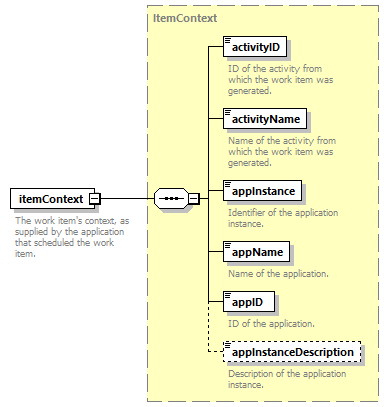 |
||
| type | ItemContext | ||
| properties |
|
||
| children | activityID activityName appInstance appName appID appInstanceDescription | ||
| annotation |
|
||
| source | <xs:element name="itemContext" type="ItemContext"> <xs:annotation> <xs:documentation>The work item's context, as supplied by the application that scheduled the work item.</xs:documentation> </xs:annotation> </xs:element> |
element scheduleWorkItemWithModel/itemBody
| diagram | 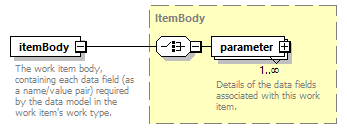 |
||
| type | ItemBody | ||
| properties |
|
||
| children | parameter | ||
| annotation |
|
||
| source | <xs:element name="itemBody" type="ItemBody"> <xs:annotation> <xs:documentation>The work item body, containing each data field (as a name/value pair) required by the data model in the work item's work type.</xs:documentation> </xs:annotation> </xs:element> |
element scheduleWorkItemWithModel/dynamicEntities
| diagram | 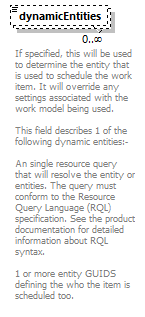 |
||||||
| type | xs:string | ||||||
| properties |
|
||||||
| annotation |
|
||||||
| source | <xs:element name="dynamicEntities" type="xs:string" minOccurs="0" maxOccurs="unbounded"> <xs:annotation> <xs:documentation>If specified, this will be used to determine the entity that is used to schedule the work item. It will override any settings associated with the work model being used. This field describes 1 of the following dynamic entities:- An single resource query that will resolve the entity or entities. The query must conform to the Resource Query Language (RQL) specification. See the product documentation for detailed information about RQL syntax. 1 or more entity GUIDS defining the who the item is scheduled too. </xs:documentation> </xs:annotation> </xs:element> |
element scheduleWorkItemWithModel/dynamicOrgAttributes
| diagram | 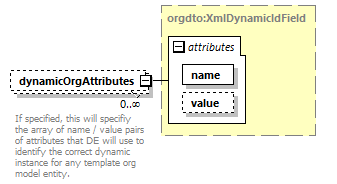 |
||||||||||||||||||
| type | XmlDynamicIdField | ||||||||||||||||||
| properties |
|
||||||||||||||||||
| attributes |
|
||||||||||||||||||
| annotation |
|
||||||||||||||||||
| source | <xs:element name="dynamicOrgAttributes" type="orgdto:XmlDynamicIdField" minOccurs="0" maxOccurs="unbounded"> <xs:annotation> <xs:documentation>If specified, this will specifiy the array of name / value pairs of attributes that DE will use to identify the correct dynamic instance for any template org model entity.</xs:documentation> </xs:annotation> </xs:element> |
element scheduleWorkItemWithModel/allocateToMember
| diagram |  |
||||||
| type | xs:string | ||||||
| properties |
|
||||||
| annotation |
|
||||||
| source | <xs:element name="allocateToMember" type="xs:string" minOccurs="0"> <xs:annotation> <xs:documentation>If specified this Work Item will be allocated to this resource GUID, if the resource is in the offerset.</xs:documentation> </xs:annotation> </xs:element> |
WSDL documentation generated by XMLSpy WSDL Editor http://www.altova.com/xmlspy